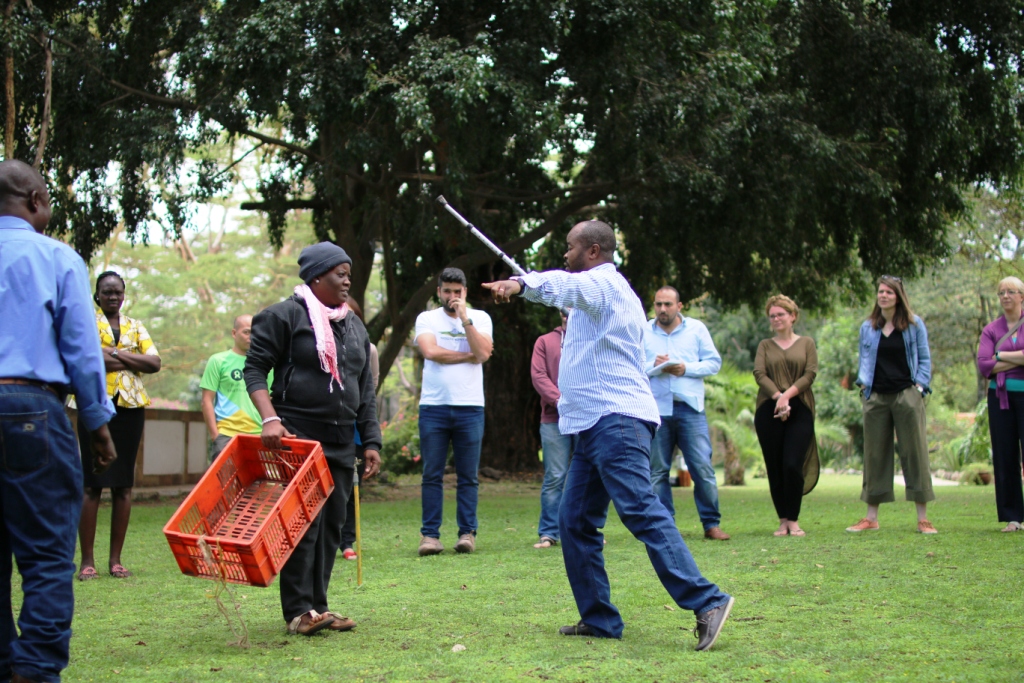By Kerry Ann Akers, Protection Project Manager at Oxfam
I usually hate interactive sessions where you have to embarrass yourself in front of everyone - being made to sing, act or reveal something personal in one of those trust building, ice breaking, team strengthening group exercise things.
Augustin Titi gets this and makes it easy for us all. Augustin works for a small organisation called CEDIER based deep in the Democratic Republic of Congo. He’s teaching us how he’s been able to get authorities like armed groups to listen to his community when they ask them to stop arresting them unlawfully, or sexually abusing them or extorting them.
Augustin knows how awkward these interactive sessions can be and somehow he makes it easy for us all. He doesn’t ask us to say a word, just to stand in a position which demonstrates a power dynamic. One colleague stands motionless holding a crutch raised in the air like a gun, looking angrily at another who clutches a crate, representing a water container.
Very quickly we are all engaged. It’s evident that any embarrassment has evaporated and I can see how Augustin is able to get police officers and soldiers to engage with these activities so successfully. Within minutes we are all discussing what scenarios our colleagues, frozen in mid action, remind us of.
Soon we are discussing violations by armed groups in South Sudan, the police in DRC and authorities in Lebanon.
CEDIER, the Centre pour le Developppement Integrale de L'enfant Rural, has been working with Oxfam on the Protection in Practice project, part of the Disasters and Emergency Preparedness Programme, a global effort backed by DFID to improve the way aid works, and so to save more lives.
One way the programme does this is through giving local organisations like CEDIER more say over how aid money is spent in their community – because local groups know better than anyone what their communities need. CEDIER chose to work with Oxfam, to make their community safer by addressing police brutality and corruption.
CEDIER identified drama as a possible way to tackle these problems. Oxfam and CEDIER asked the “Theatre for a Change” organisation to come to DRC and teach its staff how to use drama to tackle abusive behaviour by authorities.
Augustin tells us how for years his organisation struggled to get the police to listen to community complaints about their behavior – such as men being arrested for no reason and locked in a cell until the families pay the ‘ransom’ for their release.
People were scared to complain to the police directly but came to CEDIER, where they would discuss these problems with Augustin and his team, because they knew them and trusted them. CEDIER has been working in the community for years to make people safer. Now they have trained them on how to use drama techniques to help communities address the problem.
The drama techniques are designed to avoid confrontation and they allow the police themselves to act out, or identify, abuses of power within the scenes being played out.
Police are asked to explore the emotions of the victims and think about how things like arbitrary detention might affect families and communities. As a result, relationships between the police and the communities have improved. Communities are less reluctant to engage with the police, who in turn have recognised the damage their actions can have on people.
The community reports that arbitrary arrests have decreased; the police have asked for more opportunities to engage in this way, and for police forces across different districts also to take part in future.
Augustin tells us how pivotal these interactive sessions could be for some women in an area where tensions have ended in bloodshed twice in recent years.
"Since the massacres which occurred in the Ruzizi area, the two communities affected by the conflict have been deeply divided,” he says.
Yet despite this, women from opposing groups were able to come together through the community drama activity Augustin helped to lead. One woman told him how moved she was by the opportunity to reconcile with women from the other side of the conflict.
“She said it was the first time they had met, laughed and played again together since the massacres," he recalls.
Read more about the Protection in Practice project
Read more about the Disasters and Emergencies Preparedness Programme

